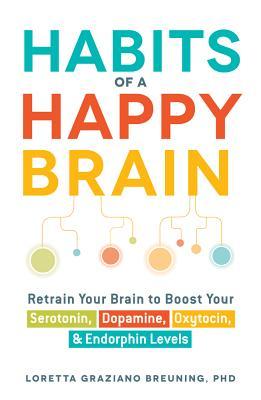Habits of a Happy Brain Summary
7 min read ⌚
 Refrain Your Brain to Boost Your Serotonin, Dopamine, Oxytocin, & Endorphin Levels
Refrain Your Brain to Boost Your Serotonin, Dopamine, Oxytocin, & Endorphin Levels
You probably think that happiness is all about singing in the morning and cleaning your closets, right? Well, it may be so, indeed! But, the underlying truth is much less poetic: it’s all down to chemicals. And not too many of them, either.
You’ve read many books on the philosophy of happiness. “Habits of a Happy Brain” is one of the few books dedicated on the biology of happiness. And while there are always alternatives in philosophy, there is surely no escape from biology.
Who Should Read “Habits of a Happy Brain”? And Why?
Since it deals with happiness, “Habits of a Happy Brain” is a book which should interest most people; since it also deals with mammalian biology, it’s a book which should tickle the fancy of specialists who are trying to find out the biological explanation of happiness.
Finally, since it’s one of the more exciting books to stem from the positive psychology movement, it’s undoubtedly an essential read for those who have read and liked the writings of Martin E. P. Seligman, Mihaly Csikszentmihalyi or even Jonathan Haidt.
About Loretta Graziano Breuning
 Loretta Graziano Breuning is the Founder of the Inner Mammal Institute and Professor Emerita of Management at California State University.
Loretta Graziano Breuning is the Founder of the Inner Mammal Institute and Professor Emerita of Management at California State University.
She obtained her BA from Cornell and her Ph.D. from Tufts University. Interested in the biological foundation of happiness, she has developed an original set of theories and exercises which have helped many people. As a result, she has been featured (among many other places) on “Forbes,” “the Wall Street Journal,” Fox, and NBC.
Breuning has authored few other books, among them: “I, Mammal,” and “The Science of Positivity.” “Habits of a Happy Brain” is an update od “Meet Your Happy Chemicals.”
“Habits of a Happy Brain Summary”
True, you are the pinnacle of evolution – and that lovely little sapiens in your taxonomic name is all the evidence you’ll ever need to prove it.
However, two things you may have forgotten!
First of all, “homo sapiens” is your species, and there are few other more inclusive taxonomic ranks to which you belong as well. For example, you are in the order of primates, which are in the class of mammals, which, in turn, belong to the kingdom of animals.
That’s right – you, as smart as you like to think you are, are still an animal, just like the lion or the rabbit is.
The second thing is even more interesting. Consider it evolution’s cruel little joke. Namely, the organ which has granted you the privilege of that “sapiens” in your taxonomic name is the very same organ which makes you less happy than, say, mice or lizards.
Why is that?
Well, because, when it comes to happiness, your brain essentially functions the same way a mouse’s does (after all, you are in the same order). With one big difference, that is.
True, you both have the same hormones for happiness, but your regulatory system is all messed up. Because, well, you have millions of additional neurons which don’t really know what to do – so they invent themselves tasks.
Try to understand them: they got the way that they are by alarming you whether running away from lions is good for you. And now – there are no lions to run away from.
But, which are these happy brain chemicals?
Well, there are four.
First of all – dopamine. Or – the “I can get it” hormone. In the animal’s world, this is the chemical released when a tiger sees an eland it can catch. In your world – it’s the excitement you feel when you reward yourself a chocolate bar for dieting few hours.
Next – endorphin. Or – the “I’m feeling no pain” hormone. It’s the chemical which masks pain. So, when a gazelle is bitten by a lion, she is still capable of fighting back, because her brain releases endorphin, telling her “that bite mark’s not so serious now…” Of course it’s going to hurt afterward.
The third one – oxytocin. Or – the “I trust you” hormone. This one’s released when an animal is among its own kind. It feels protected – and knows that it can rely on those around it. But, you know this: you’ve felt its effect best that time your mother patiently took care of you when you were sick as a child.
Serotonin is the final chemical on our list. It’s the “I’m top dog” hormone. Or, in other words, the one which makes the gorilla alpha male strut so proudly!
As is probably already apparent from these descriptions, all of these chemicals come with a caveat. For example, serotonin may make you feel isolated and result in frustration about your own uniqueness; oxytocin may result in herd behavior, and that helps no one.
Even if you’re an endorphin-addict and you are in a “50 Shades of Grey” mood all the time, causing yourself pain may debilitate you in a much more physical sense. (Remember that “Black Mirror” scene?) Finally, dopamine is habituated pretty quickly, leaving you with a “been there/done that” feeling even about things you really like.
And that – right there: that’s what makes “permanent happiness” a biological myth. It’s unattainable since your brain cares about your selfish genes and happiness is its way of doing it. Namely – if it’s good for your survival, it says “do it”; if it’s bad “don’t do it.”
However, once it teaches you that something is good, it doesn’t bother to release the hormones anymore. Leaving you with a habit – but taking away the happiness from it.
Your only way out?
Try to force your brain into rewiring by going against the stream and boldly taking up new habits every 45 days or so.
As its title implies, “Habits of a Happy Brain” has many exercises inside to help you!
Key Lessons from “Habits of a Happy Brain”
1. There Are Unhappy Chemicals as Well
2. How Your Favorite Song Starts to Irritate You
3. You Can’t Be Happy All the Time – Be from Time to Time
There Are Unhappy Chemicals as Well
We went over the four happy chemicals which your brain releases to tell you what’s good for you. A quick reminder, these are dopamine (related to rewards), oxytocin (associated with your social life), endorphin (pushing you through physical pain), and serotonin (making you feel special).
Now, there are unhappy chemicals as well. For example, cortisol. It’s a sweet little chemical which has helped you survive, by telling you what you shouldn’t do. However, nowadays, there are no risks – so it’s basically obsolete. But, it still transforms into stress – over utterly irrelevant matters.
Learn how to use it to your favor from this summary.
How Your Favorite Song Starts to Irritate You
“Music gives pleasure because your mind keeps predicting what comes next,” writes Loretta Graziano Breuning.
And it’s simple: each correct prediction triggers dopamine. If the music is unfamiliar, you don’t get the chemical. When it is somewhat familiar – you feel as if you want to dance. However, when it is too familiar, your brain predicts what happens next effortlessly. And this doesn’t get you dopamine either.
So, as Loretta Graziano Breuning says, “to make you happy, music must be at the sweet spot of novelty and familiarity.” We’ll put it a bit differently: stop playing that song on the repeat! You’ll start hating it in few days.
You Can’t Be Happy All the Time – Be from Time to Time
What Breuning says about music – applies to almost everything else in life.
Want to enjoy some food the same way for the rest of your life? Eat it from time to time – not every day. Want to be longer in love? Don’t spend every waking minute of your day with your beloved.
However, in either case, don’t expect to be happy all the time. Because that just won’t work. Your brain won’t allow you. It’s just the way it functions: every time it remembers something well – it actually takes away a lot of the happiness related to it.
And it needs to remember many things so that you can survive.
Like this summary? We’d like to invite you to download our free 12 min app, for more amazing summaries and audiobooks.
“Habits of a Happy Brain” Quotes
When a monkey loses a banana to a rival, he feels bad, but he doesn't expand the problem by thinking about it over and over. He looks for another banana. He ends up feeling rewarded rather than harmed. Share on X We seek evidence of threats to feel safe, and we get a dopamine boost when we find what we seek. You can also get a serotonin boost from the feeling of being right, and an oxytocin boost from bonding with those who sense the same threat. Share on X Consider this: when things do go wrong, ask yourself whether you could have prevented it by being unhappy. Share on X You don’t notice your neural guidance system because you built it without conscious intent. That’s why it’s hard to build new trails: You don’t know how you built the old ones. Share on X Love is a huge surge of happy chemicals because it's highly relevant to the survival of your genes. Share on XOur Critical Review
Perhaps the best thing about “Habits of a Happy Brain” is the fact that it delves deep into the biology of happiness, but in a manner which helps the reader attain the information with ease. And that’s only the first half of the book.
The second half is a list of step-by-step instructions for few exercises which should help you rewire your brain. So, you get the best of both worlds – theory, and practice.
And you can’t ask for more from a book which talks about your happiness.
Emir is the Head of Marketing at 12min. In his spare time, he loves to meditate and play soccer.


 Refrain Your Brain to Boost Your Serotonin, Dopamine, Oxytocin, & Endorphin Levels
Refrain Your Brain to Boost Your Serotonin, Dopamine, Oxytocin, & Endorphin Levels




